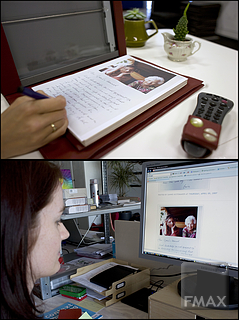Delta and Delft Integraal often write about innovative ideas that offer big promises for the future. But what has happened to such ideas a couple years on? What for instance has happened to ‘Piece of Family’, a multimedia device for the elderly that Sanne Kistemaker designed two years ago?
Delta, 1-11-2007
‘Sanne Kistemaker has won the ‘Design for All Award’ for a communication device for the elderly’
For many elderly people it is difficult to surf the internet, yet at the same time it is completely normal for their grandchildren to use the web to stay in touch with friends and relatives. To close the gap between the different generations on the internet, Sanne Kistemaker designed ‘Piece of Family’, a multimedia device that makes it easy for the elderly to go online and communicate with relatives through a weblog.
‘Piece of Family’ consists of a book, a writing pad and a scanner. Grandparents for instance write messages to their families on the writing pad. They then scan these messages and post them online, via a cordless internet connection, on a specially created ‘family page’, which the elderly can also view on their televisions. The grandchildren use a computer to visit the same family page to read the scanned, hand-written messages from grandma or grandpa, and they can then type a reply. “With ‘Piece of Family’, both generations use what they’re most familiar with to communicate”, industrial designer Kistemaker says. “And by doing so they can stay in touch with each other.”
Recently Kistemakers invention won a design award for the third time. “That’s great,” says Kistemaker, who designed the device two years ago as a graduation assignment. “But unfortunately it’s still not on the market.
Vodafone was interested for a while, but they decided not to produce it, because they came to the conclusion that hardware was not their core business.”
Kistemaker is now close to making a deal with TU Delft, in which a YESDelft company could put it on the market. “The design, concept, functionality and interaction level is all there,” she explains. “We know how the elderly use it, because of my research. But there are also things that still need to be done. ‘Piece of Family’ must be cordless, because the elderly could trip over a cord, and this makes the device more expensive. ‘Piece of Family’ should cost no more than three hundred euro, or half of what you pay for a laptop. But we have to be quick to put it on the market. The elderly of today don’t know how to use computers, but that’s a temporary problem. The elderly of the future will be more familiar with computers, so it’s important to put a spin-off on the market as soon as possible.”
Voedselproducenten stoppen allerlei rommel in hun waren om ze houdbaar, kneedbaar en vloeibaar te houden. Volgens Will Jansen wordt de consument ‘gore troep’ aangesmeerd. Tijdens het bewerken van voedsel gaan vitaminen en mineralen verloren. Jansen schreef het gidsje ‘Wat zit er in uw eten?’ en is sinds 2003 uitgever en hoofdredacteur van het culinaire magazine Bouillon.
Hij windt zich op over producten in de supermarkt: “Het is ellende. Diep tragisch.” In de zaal staat een tafel met verschillende producten uit de supermarkt. Kant-en-klaarmaaltijden, ontbijtdrankjes, cola, M&M’s. Een kleine greep uit de grote collectie producten die volgens Jansen niet goed zijn. Jansen voelt zich bij de neus genomen: “Ze verkopen me gebakken lucht!” Hij wijst naar een potje Hero Delight op de tafel: “Dat is suikerpap, geen jam!”
Jansen vindt de overheid verantwoordelijk: “De overheid moet voor de veiligheid van mijn eten zorgen. Er wordt hier verschrikkelijk veel geld mee verdiend. De politiek is ook beïnvloedbaar. Als er geld mee te verdienen valt, is het ineens wel goed.”
De culinaire filosoof maakt zich boos om het feit dat producenten altijd praten over een toelaatbare hoeveelheid van een bepaald middel: “Eigenlijk zeggen ze: het is niet goed, maar als je voorzichtig doet kun je het wel hebben. Stop het er dan niet in.”
De boodschappen op de tafel krijgen er flink van langs. Neem brood. Volkorenbrood bevat methylcellulose, gemaakt van hout. Leuk detail: kunstmatig sperma in de porno-industrie bevat ook methylcellulose. De mensen in de zaal lachen erom, maar Jansen vraagt zich serieus af of je nog wel van brood kunt genieten als je dit weet.
Hij raadt de toehoorders aan om de etiketten op de producten te lezen en om naar een natuurwinkel te gaan: “Koop je groente, boter, melk en aardappelen bij de natuurwinkels. Zij staan er voor garant dat er niet mee geknoeid is.” Eten moet je lichaam een plezier doen, vindt hij. Je moet er weerstand mee kunnen opbouwen en weer op kracht kunnen komen. “Gezondheid is nergens te koop. Stop echt eten in je motor. Wanneer en waarom hebben wij afgesproken dat eten zo goedkoop moet zijn?”, vraagt Jansen zich af. De consument zoekt nauwkeurig uit welke auto hij het beste kan kopen, maar wat betreft eten wordt er alleen naar de laagste prijs gekeken. “Eten is geen voeden meer, maar vullen.” Volgens de filosofie van Jansen hebben mensen hun dikke billen en grote borsten dankzij het voedsel. “De billen van varkens worden omhoog gespoten. Het middeltje dat daarvoor zorgt, stopt niet als je het in je mond stopt.”
Dat de mensen in de zaal nieuwsgierig zijn naar welke producten rommel bevatten, is duidelijk. Aan het eind van de lezing staat zeker de helft in de rij om het boekje van Jansen aan te schaffen. Een trotse bezitter van Jansens boek hoopt meer inzicht te krijgen in goede voeding: “Bizar dat we zoveel troep binnenkrijgen, daar sta je helemaal niet bij stil.”
‘Veilig voedsel?’, lezing door culinair filosoof Will Jansen, maandag 15 december in Speakers. Aanvang: 20.15 uur, toegang is gratis.



Comments are closed.